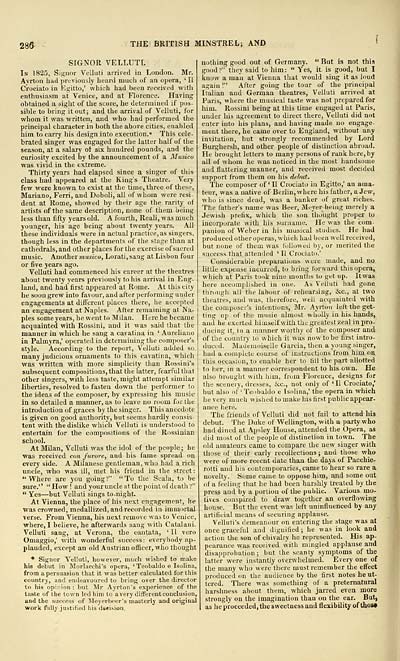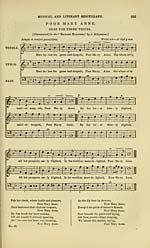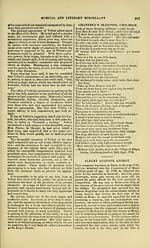Glen Collection of printed music > Printed music > British minstrel, and musical and literary miscellany
(294) Page 286
Download files
Complete book:
Individual page:
Thumbnail gallery: Grid view | List view

286^
THE BRITISH MINSTREL; AND
SIGNOR VELLUTI.
In 1825, Sijjiioi- Velluti arrived in London. Mr.
Avrton had previously heard much of an opera, ' II
Crociato in Egitto,' which had been received with
enthusiasm at Venice, and at Florence. Having
obtained a sight of the score, he determined if pos-
sible to bring it out ; and the arrival of Velluti, for
whom it was written, and who had performed tlie
principal character in both the above cities, enabled
him to carry his design into execution.* This cele-
brated singer was engaged for the latter half of the
season, at a salary ot six hundred pounds, and the
curiosity excited by the announcement of a Musico
was vivid in the extreme.
Thirty years had elapsed since a singer of this
class had appeared at the King's Theatre. Very
few were known to exist at the time, three of these,
Mariano, Ferri, and Doboli, all of whom were resi-
dent at Rome, showed by their age the rarity of
artists of the same description, none of them being
less than fifty years old. A fourth, Reali, was much
younger, his age being about twenty years. All
these individuals were in actual practice, as singers,
though less in the departments of the stage than at
cathedrals, and other places for the exercise of sacred
music. Another musico, Lorati, sang at Lisbon four
or five years ago.
Velluti had commenced his career at the theatres
about twenty years previously to his arrival in Eng-
land, and had first appeared at Rome. At this city
he soon grew into favour, and after performing under
engagements at difl'erent places there, he accepted
an engagement at Naples. After remaining at Na-
ples some years, he went to Milan. Here he became
acquainted with Rossini, and it was said that the
manner in which he sang a cavatina in ' Aureliano
in Palmyra,' operated in determining the composer's
style. According to the report, Velluti added so
many judicious ornaments to this cavatina, which
was written with more simplicity than Rossini's
subsequent compositions, that the latter, fearful that
other singers, with less taste, might attempt similar
liberties, resolved to fasten down the performer to
the ideas of the composer, by expressing his music
in so detailed a manner, as to leave no room for the
introduction of graces by the singer. This anecdote
is given on good authority, but seems hardly consis-
tent with the dislike which Velluti is understood to
entertain for the compositions of the Rossiuian
school.
At Milan, Velluti was the idol of the people ; he
was received coti furore, and his fame spread on
every side. A Milanese gentleman, who had a rich
uncle, who was ill, met his friend in the street:
"Where are you going?" "To the Scala, to be
sure." " How ! and your uncle at the point of death ?"
" Yes — but Velluti sings to-night.
At Vienna, the place of his next engagement, he
was crowned, medallized, and recorded in immnrtal
verse. From Vienna, his next remove was to Venice,
where, I believe, he afterwards sang with Catalan!.
Velluti sang, at Verona, the cantata, ' II vero
Omaggio,' with wonderful success: everybody ap-
plauded, except an old Austrian officer, who thought
* Signor Velluti, however, much wished to make
his debut in Morlacchi's opera, ' Teobaldo e Isolina,
from a persuasion that it was better calculated for this
country, and endeavoured to bring over the director
to his opinion: but Mr Ayrton's experience of the
taste of the town led him to avery different conclusion,
and the success of Meyerbeer's masterly and original
work f\i\ly justified his dosision.
nothing good out of Germany. " But is not this
good?" they said to him: " Yes, it is good, but I
know a man at Vienna that would sing it as loud
again I" After going the tour of the principal
Italian and German theatres, Velluti arrived at
Paris, where the musical taste was not prepared for
him. Rossini being at this time engaged at Paris,
under his agreement to direct there, Velluti did not
enter into his plans, and having made no engage-
ment there, he came over to England, without any
invitation, but strongly recommended by Lord
Burghersh, and other people of distinction abroad.
He brought letters to many persons of rank here, by
all of whom he was noticed in the most handsome
and flattering manner, and received most decided
support from them on his debut.
The composer of ' II Crociato in Egitto,' an ama-
teur, was a native of Berlin, where his father, a Jew,
who is since dead, was a banker of great riches.
The father's name was Beer, Meyer being merely a
Jewish prefix, which the son thought proper to
incorporate with his surname. He was the com-
panion of Weber in his musical studies. He had
produced otheroperas, which had been well received,
but none of them was followed by, or merited the
success that attended ' II Crociato.'
Considerable preparations were maile, and no
little expense incurred, to bring forwai-d this opera,
which at Paris took nine mouths to get up. It was
here accomplished in one. As V'elluti had gone
through all the labour of rehearsing, &.C., at two
theatres, and was, tlitrefore, well acquainted with
the composer's intentions, Mr. Ayrtou left the get-
ting up of the music almost wholly in his hands,
and he exerted himself with the greatest zeal in pro-
ducing it, in a manner worthy of the composer and
of the country to which it was now to be first intro-
duced. Mademoiselle Garcia, then a young singer,
had a complete course of insti-uctions from him on
this occasion, to enable her to fill the part allotted
to her, in a manner correspondent to his own. He
also brought with him, from Florence, designs for
the sceneiy, dresses, &c., not only of ' II Crociato,'
but also of ' Teobaldo e Isolina,' the opera in which
he very much wished to make his first public appear-
ance here.
The friends of Velluti did not fail to attend his
debut. The Duke of Wellington, with a party who
had dined at Apsley House, attended the Opera, as
did most of the people of distinction in town. The
old amateurs came to compare the new singer with
those of their early recollections ; and those who
were of more recent date than the days of Pacchie-
rotti and his contemporaries, came to hear so rare a
novelty. Some came to oppose him, and some out
of a feeling that he had been harshly treated by the
press and by a portion of the public. Various ino-
lives conspired to draw together an overflowing
house. But the event was left uninfluenced by any
artificial means of securing applause.
Velluti's demeanour on entering the stage was at
once graceful and dignified ; he was in look and
action the son of chivalry he represented. His ap-
pearance was received vvith mingled applause and
disapprobation ; but the scanty symptoms of the
latter were instantly overwhelmed. Every one of
the many who were there must remember the effect
produced on the audience by the first notes he ut-
tered. There was something of a preternatural
harshness about them, which jarred even more
strongly on the imagination than on the ear. But,
as he proceeded, the sweetness and flexibility of tllo»»
THE BRITISH MINSTREL; AND
SIGNOR VELLUTI.
In 1825, Sijjiioi- Velluti arrived in London. Mr.
Avrton had previously heard much of an opera, ' II
Crociato in Egitto,' which had been received with
enthusiasm at Venice, and at Florence. Having
obtained a sight of the score, he determined if pos-
sible to bring it out ; and the arrival of Velluti, for
whom it was written, and who had performed tlie
principal character in both the above cities, enabled
him to carry his design into execution.* This cele-
brated singer was engaged for the latter half of the
season, at a salary ot six hundred pounds, and the
curiosity excited by the announcement of a Musico
was vivid in the extreme.
Thirty years had elapsed since a singer of this
class had appeared at the King's Theatre. Very
few were known to exist at the time, three of these,
Mariano, Ferri, and Doboli, all of whom were resi-
dent at Rome, showed by their age the rarity of
artists of the same description, none of them being
less than fifty years old. A fourth, Reali, was much
younger, his age being about twenty years. All
these individuals were in actual practice, as singers,
though less in the departments of the stage than at
cathedrals, and other places for the exercise of sacred
music. Another musico, Lorati, sang at Lisbon four
or five years ago.
Velluti had commenced his career at the theatres
about twenty years previously to his arrival in Eng-
land, and had first appeared at Rome. At this city
he soon grew into favour, and after performing under
engagements at difl'erent places there, he accepted
an engagement at Naples. After remaining at Na-
ples some years, he went to Milan. Here he became
acquainted with Rossini, and it was said that the
manner in which he sang a cavatina in ' Aureliano
in Palmyra,' operated in determining the composer's
style. According to the report, Velluti added so
many judicious ornaments to this cavatina, which
was written with more simplicity than Rossini's
subsequent compositions, that the latter, fearful that
other singers, with less taste, might attempt similar
liberties, resolved to fasten down the performer to
the ideas of the composer, by expressing his music
in so detailed a manner, as to leave no room for the
introduction of graces by the singer. This anecdote
is given on good authority, but seems hardly consis-
tent with the dislike which Velluti is understood to
entertain for the compositions of the Rossiuian
school.
At Milan, Velluti was the idol of the people ; he
was received coti furore, and his fame spread on
every side. A Milanese gentleman, who had a rich
uncle, who was ill, met his friend in the street:
"Where are you going?" "To the Scala, to be
sure." " How ! and your uncle at the point of death ?"
" Yes — but Velluti sings to-night.
At Vienna, the place of his next engagement, he
was crowned, medallized, and recorded in immnrtal
verse. From Vienna, his next remove was to Venice,
where, I believe, he afterwards sang with Catalan!.
Velluti sang, at Verona, the cantata, ' II vero
Omaggio,' with wonderful success: everybody ap-
plauded, except an old Austrian officer, who thought
* Signor Velluti, however, much wished to make
his debut in Morlacchi's opera, ' Teobaldo e Isolina,
from a persuasion that it was better calculated for this
country, and endeavoured to bring over the director
to his opinion: but Mr Ayrton's experience of the
taste of the town led him to avery different conclusion,
and the success of Meyerbeer's masterly and original
work f\i\ly justified his dosision.
nothing good out of Germany. " But is not this
good?" they said to him: " Yes, it is good, but I
know a man at Vienna that would sing it as loud
again I" After going the tour of the principal
Italian and German theatres, Velluti arrived at
Paris, where the musical taste was not prepared for
him. Rossini being at this time engaged at Paris,
under his agreement to direct there, Velluti did not
enter into his plans, and having made no engage-
ment there, he came over to England, without any
invitation, but strongly recommended by Lord
Burghersh, and other people of distinction abroad.
He brought letters to many persons of rank here, by
all of whom he was noticed in the most handsome
and flattering manner, and received most decided
support from them on his debut.
The composer of ' II Crociato in Egitto,' an ama-
teur, was a native of Berlin, where his father, a Jew,
who is since dead, was a banker of great riches.
The father's name was Beer, Meyer being merely a
Jewish prefix, which the son thought proper to
incorporate with his surname. He was the com-
panion of Weber in his musical studies. He had
produced otheroperas, which had been well received,
but none of them was followed by, or merited the
success that attended ' II Crociato.'
Considerable preparations were maile, and no
little expense incurred, to bring forwai-d this opera,
which at Paris took nine mouths to get up. It was
here accomplished in one. As V'elluti had gone
through all the labour of rehearsing, &.C., at two
theatres, and was, tlitrefore, well acquainted with
the composer's intentions, Mr. Ayrtou left the get-
ting up of the music almost wholly in his hands,
and he exerted himself with the greatest zeal in pro-
ducing it, in a manner worthy of the composer and
of the country to which it was now to be first intro-
duced. Mademoiselle Garcia, then a young singer,
had a complete course of insti-uctions from him on
this occasion, to enable her to fill the part allotted
to her, in a manner correspondent to his own. He
also brought with him, from Florence, designs for
the sceneiy, dresses, &c., not only of ' II Crociato,'
but also of ' Teobaldo e Isolina,' the opera in which
he very much wished to make his first public appear-
ance here.
The friends of Velluti did not fail to attend his
debut. The Duke of Wellington, with a party who
had dined at Apsley House, attended the Opera, as
did most of the people of distinction in town. The
old amateurs came to compare the new singer with
those of their early recollections ; and those who
were of more recent date than the days of Pacchie-
rotti and his contemporaries, came to hear so rare a
novelty. Some came to oppose him, and some out
of a feeling that he had been harshly treated by the
press and by a portion of the public. Various ino-
lives conspired to draw together an overflowing
house. But the event was left uninfluenced by any
artificial means of securing applause.
Velluti's demeanour on entering the stage was at
once graceful and dignified ; he was in look and
action the son of chivalry he represented. His ap-
pearance was received vvith mingled applause and
disapprobation ; but the scanty symptoms of the
latter were instantly overwhelmed. Every one of
the many who were there must remember the effect
produced on the audience by the first notes he ut-
tered. There was something of a preternatural
harshness about them, which jarred even more
strongly on the imagination than on the ear. But,
as he proceeded, the sweetness and flexibility of tllo»»
Set display mode to: Large image | Transcription
Images and transcriptions on this page, including medium image downloads, may be used under the Creative Commons Attribution 4.0 International Licence unless otherwise stated. ![]()
| Special collections of printed music > Glen Collection of printed music > Printed music > British minstrel, and musical and literary miscellany > (294) Page 286 |
|---|
| Permanent URL | https://digital.nls.uk/91438473 |
|---|
| Description | Scottish songs and music of the 18th and early 19th centuries, including music for the Highland bagpipe. These are selected items from the collection of John Glen (1833 to 1904). Also includes a few manuscripts, some treatises, and other books on the subject. |
|---|
| Description | The Glen Collection and the Inglis Collection represent mainly 18th and 19th century Scottish music, including Scottish songs. The collections of Berlioz and Verdi collected by bibliographer Cecil Hopkinson contain contemporary and later editions of the works of the two composers Berlioz and Verdi. |
|---|

